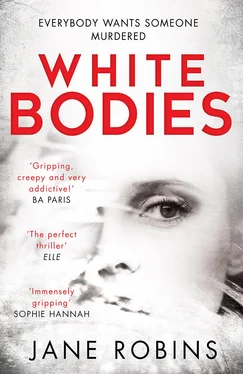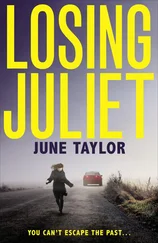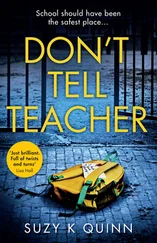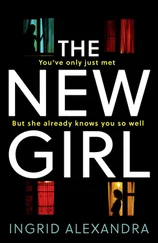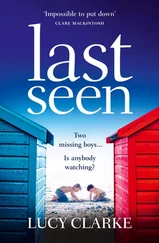JANE ROBINSbegan her career as a journalist with The Economist , the BBC and the Independent on Sunday . She has written three previous books of non-fiction, Rebel Queen (Simon & Schuster), The Magnificent Spilsbury and The Curious Habits of Dr. Adams (both John Murray).
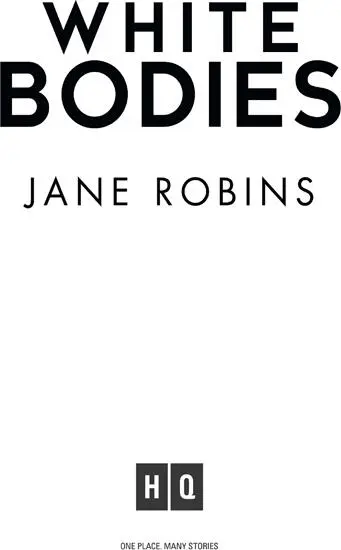
COPYRIGHT Copyright

An imprint of HarperCollinsPublishers Ltd.
1 London Bridge Street
London SE1 9GF
First published in Great Britain by HQ in 2017
Copyright © Jane Robins 2017
Jane Robins asserts the moral right to be identified as the author of this work.
A catalogue record for this book is available from the British Library.
This novel is entirely a work of fiction. The names, characters and incidents portrayed in it are the work of the author’s imagination. Any resemblance to actual persons, living or dead, events or localities is entirely coincidental.
All rights reserved under International and Pan-American Copyright Conventions. By payment of the required fees, you have been granted the non-exclusive, non-transferable right to access and read the text of this e-book on-screen. No part of this text may be reproduced, transmitted, downloaded, decompiled, reverse engineered, or stored in or introduced into any information storage and retrieval system, in any form or by any means, whether electronic or mechanical, now known or hereinafter invented, without the express written permission of HarperCollins.
Ebook Edition © December 2017 ISBN: 9780008217570
Version: 2018-03-21
For Carol
Contents
Cover
About the Author JANE ROBINS began her career as a journalist with The Economist , the BBC and the Independent on Sunday . She has written three previous books of non-fiction, Rebel Queen (Simon & Schuster), The Magnificent Spilsbury and The Curious Habits of Dr. Adams (both John Murray).
Title Page
Dedication For Carol
Autumn 2017
Spring 2017
Chapter 1
Chapter 2
1997
Chapter 3
Chapter 4
Chapter 5
2000
Chapter 6
Chapter 7
Chapter 8
2000
Chapter 9
Chapter 10
Chapter 11
Chapter 12
Chapter 13
2006
Chapter 14
Chapter 15
Chapter 16
Chapter 17
Chapter 18
Chapter 19
Chapter 20
Chapter 21
Chapter 22
Chapter 23
Chapter 24
Chapter 25
Chapter 26
Chapter 27
Chapter 28
Chapter 29
Chapter 30
Chapter 31
Chapter 32
Chapter 33
Chapter 34
Chapter 35
Chapter 36
Chapter 37
Chapter 38
Chapter 39
Chapter 40
Chapter 41
Chapter 42
Chapter 43
Chapter 44
Chapter 45
Chapter 46
Chapter 47
Chapter 48
Chapter 49
Chapter 50
Acknowledgements
Copyright
AUTUMN 2017
The evidence suggests that Felix showered. Beyond that, I know practically nothing about his final hours on this earth. All I have is the odd scrap of information and the patchy impressions of the bystanders, and it’s like I’m at the theatre, looking at the stage and seeing only the supporting cast, the scenery and the arrangement of shadows. All the important elements are missing. There are no principal actors, no stage directions and no script.
The receptionist said this – that Felix’s last morning was fresh and cold, that there was a frost on the lawn outside the hotel and a mist in the distance, where the woods are. She’d watched Felix sprinting out of the hotel, down the gravel drive, then turning left at the gate. ‘I was arriving for work and I called out “Good morning!”’ she said. ‘But he didn’t reply; he just kept running.’
Forty minutes later, he was back, dropping his head to catch his breath, panting and sweating. He straightened up and, now noticing the receptionist, said that he’d sprinted all the way to the golf course, running the perimeter and the long path through the woods back to the hotel. He thought that the sun glancing through the trees had been magical, as though life was just beginning (how extraordinary that he should say such a thing!). Then he took the stairs up to his room, two at a time.
He didn’t come down to breakfast or order anything to be sent up, not even the continental breakfast that was included in the room rate. His colleague, Julio, said he was surprised when Felix failed to attend the first session of the conference. At the mid-morning break, Julio carried a cup of coffee and a biscuit up to the room, but found the Do Not Disturb sign hanging on the door. He thought Felix was unwell, sleeping maybe, so he drank the coffee himself and ate the biscuit. ‘We missed him at lunch,’ he said, ‘and again in the afternoon session. By three o’clock I was calling his phone many times, but my calls went to voicemail.’ Julio felt uneasy. It was so unlike Felix to be unreliable, so he went upstairs one more time to hammer on the door, then he summoned the hotel manager, who arrived with a key.
The two men were struck by the unnatural stillness of the room, its air of unreality; Julio said it seemed considered, or planned, like a tableau vivant with Felix as the centrepiece, lying on his back on the bed in a strange balletic pose, right arm cast out across the duvet, left leg bent, bath robe open like a cape, grey eyes gazing at the ceiling. His left arm was dangling down the side of the bed, fingers suspended above the floor, and the hotel manager, who had a degree in the History of Art, was reminded of the pre-Raphaelite painting of the suicide of Thomas Chatterton. Except this didn’t look like suicide; there were no pill bottles or razor blades or other signs.
Dr Patel arrived and the receptionist stood by the door while the doctor conducted her examination. Her professional opinion was that Felix had suffered a heart attack or had some sort of seizure after his morning run. She left, and the receptionist took photographs of Felix and of the room – the bedside table, the pristine bathroom, the opened shower door, the view from the window and, finally, the untouched hospitality tray. ‘I know that was weird,’ she said. ‘But it felt like the right thing to do, to make a record.’ Maybe she thought her photos might become important, that they’d suggest that something about the scene was wrong. No one else had that sense, though. When the results of the postmortem came through, they were in agreement with Dr Patel – Felix’s death was due to heart disease.
As simple as that, he had collapsed and was gone – and for a while it seemed that he’d simply vanished. The world had swept over him like the tide coming in.
But then the funeral happened. I trekked out of London that day to a pretty Berkshire village with a Norman church sitting among gravestones and windblown copper-coloured leaves. When I saw it, I thought that Felix, who was born and raised in America, was having a very English final moment, though the mourners who were arriving in small solemn groups were from his international life. Solid men in sharply cut suits; flimsy, elegant women in heels. I watched them from a distance – in fact, from a broken bench set against the churchyard wall, where I was trying to calm down. Eventually, I slipped into the church and stood at the back.
Читать дальше
